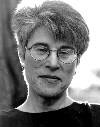Judith Hauptman
(1943 - )

Known in particular for her reinterpretation of talmudic sources along feminist lines, Judith Hauptman has spent her professional life engaged not only in the study of women's roles in Judaic thought, but also in an evaluation of the social and ethical norms of the rabbinic period that served to shape the outlines of a traditional faith passed down through the ages. Dr. Hauptman has also become acclaimed for her synoptic studies — a specialized area of talmudic research in which related texts are examined for their implications about the history of Jewish law. She does groundbreaking work in attempting to recover the form and substance of ancient rabbinic discourse.
Dr. Hauptman applies her insights to understanding the relevance of ancient sources to modern Judaism and to precipitating societal change. Over the years, her activist orientation has led her, for example, to call for the ordination of women by the Conservative movement and for eliminating discrimination against women in divorce law, both Jewish and secular.
A popular lecturer and prolific writer, Dr. Hauptman has published extensively. Among her most important articles are "Women in the Conservative Synagogue," in Daughters of the King: Women and the Synagogue (Philadelphia: Jewish Publication Society, 1992); "Abortion: Where We Stand" (United Synagogue Review, Spring 1990); "A Time to Mourn, A Time to Heal" (Celebration and Renewal, Philadelphia: Jewish Publication Society, 1993); "Conservative Judaism: The Ethical Challenge of Jewish Feminism" (The Americanization of the Jews, New York: New York University Press, 1995); "Judaism and a Just Economy," (Tikkun, January/February 1994); and "Mishnah as a Response to Tosefta" (The Synoptic Problem in Rabbinic Literature, Shaye J.D. Cohen, Brown Judaic Series, 2000). Her books include Development of the Talmudic Sugya: Relationship Between Tannaitic and Amoraic Sources (Brown Judaic Series, 1987) and Rereading the Rabbis: A Woman's Voice (Westview, 1998).
She is currently writing a book on the Mishnah and the Tosefta, two early rabbinic works. Her main argument is that the Mishnah was not the first code of Jewish law to follow the Bible, but a reworking of an even earlier collection now embedded in the Tosefta. This approach will lead to new, more nuanced interpretations of the Mishnah.
In addition to her full-time post at the Jewish Theological Seminary, where she has taught since 1973, Dr. Hauptman is a frequent instructor in the adult education program at the 92nd Street Y in New York City. She has also served on the faculties of Hebrew Union College-Jewish Institute of Religion; City College of New York; the Seminario Rabinico Latinoamericano, JTS's campus in Buenos Aires; JTS's Rebecca and Israel Ivry Prozdor supplemental Hebrew high school; the UAHC Kallah at Brandeis University and the Wexner Heritage Foundation Summer Institute in Lake Tahoe, California, and has studied at Hebrew University in Jerusalem.
Dr. Hauptman received a degree in Talmud from the Seminary College of Jewish Studies at JTS (now Albert A. List College) and a degree in economics from Barnard College and earned an MA and a PhD in Talmud from JTS. After serving as the Rabbi Philip R. Alstat Professor of Talmud for five years, Dr. Hauptman recently became the first to hold the E. Billi Ivry Chair of Talmud and Rabbinic Culture.
Sources: The Jewish Theological Seminary


